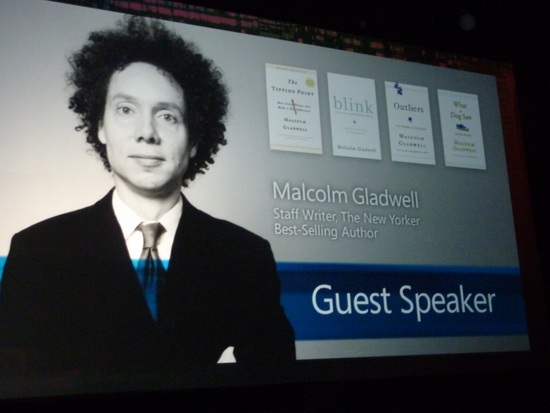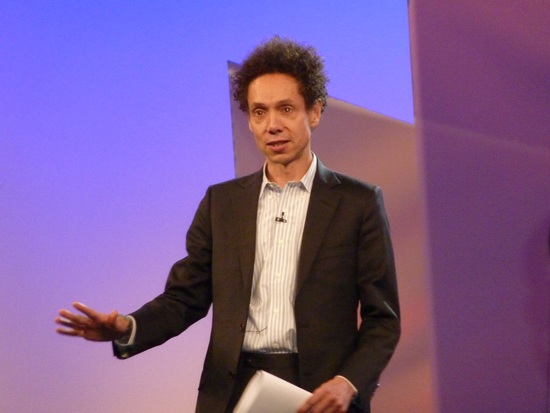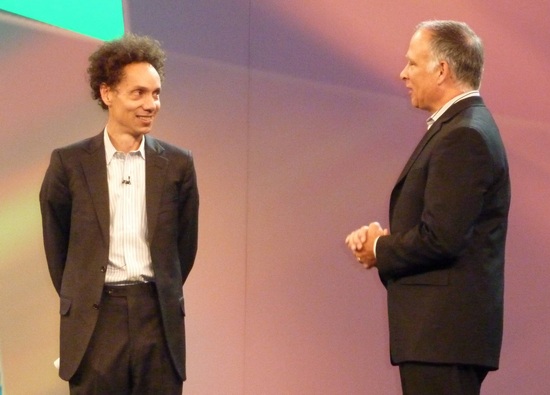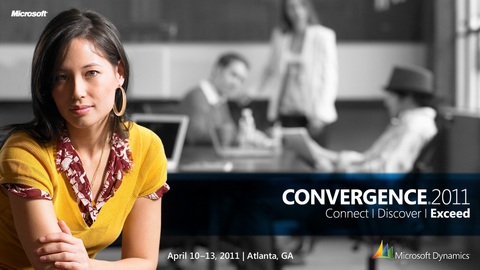Microsoft Convergence 2011 Atlanta - Day 4 Guest Speaker
Following Doug Kennedy's announcement that Convergence 2012 will be in Houston, Texas, the attendees had the pleasure of listening to Malcolm Gladwell speak. Malcolm writes for The New Yorker and is also a best selling author. For more information have a look at his site Gladwell dot com.
I will be honest, I was not sure who he was and have not read his work. This is probably related to not living in the USA (and that I normally read fantasy and science fiction when I read for entertainment). This also meant I had no expectations set. Well, I can tell you that I thoroughly enjoyed what he had to say, it was entertaining, interesting and thought provoking.

Now, I know I can never do as good a job as Malcolm, but I will try to give you a summary of what he discussed. The topic of the talk was how technology can aid in the human decision making process.
Malcolm used an example: The concept of a Home Team Advantage. In almost all sporting disciplines there is an advantage for the home team. That is that when a team plays on its home ground it is approximately 60% more likely to win than when it plays away. Research into why there is a difference produced some unexpected results.
You might think that it could be related to the support of the home crowd, or the fact that the team did not have to travel (which can be tiring), or that the climatic conditions (temperature, humidity etc.) were what they are used to, or even that the home team know the ground and its surface. Well, using tests it was proven that none of these factors were the cause of the difference.
Believe it or not, the difference was caused by referee's decisions. A penalty here, some extra time there. The referees were subconsciously being biased towards the home team. It turns out that the referees (even though they would never admit it) were bowing to the social pressure of the home crowd. They did not want to go against the crowd and make an unpopular decision, they were being emotionally intimidated.
They were unable to make complex decisions under high stress in real time with conditions of informational uncertainly with the level of accuracy that we would demand from them. In these situations, it would be difficult for any human to make a completely accurate and unbiased solution.

Malcolm Gladwell
Malcolm went on to discuss the roles of technology in the decision making process and summarised it in the following points:
- Transparency: Technology can make decision making transparent. Humans are not good at analysing decisions. Feedback from technology can help correct or improve decisions. Many experts can make quick decisions based on their experience, but they are unable to explain how they reached that decision.
- Simplicity: Technology can simplify decision making. Restoring the power of human judgement when we simplify or reduce the number of variables. Technology can assist humans by handling the mundane. When there are too many variables, humans find it hard to make accurate decisions quickly. Technology can help by removing the factors that are not relevant and clearing the "view".
- Protection: Human judgement is fragile and susceptible to bias and mistakes. Technology can protect human judgement. It is accurate and does not bow to emotional pressures. An example of this fragility is how easily a "pack mentality" can take over and allow groups to behave in a fashion that the individuals of the group would not when alone. Interestingly enough, this is why many police forces are sending out single officers in squad cars now.
Research showed that in stadiums where there an athletics track around the outer edge of the field, or when there was a smaller crowd that the effect of the home ground advantage was lessened and that the referees were less bias. This was because the emotional pressure from the crowd decreases with distance and size.
An example of how technology has helped referees be less biased towards home teams is Instant Replay. Since instant replay was introduced the home ground advantage has been reduced by one third. This is especially the case when the referee is able to view the instant replay in a special booth isolated from the sight and sound of the crowd.

Malcolm Gladwell and Doug Kennedy answering questions from the audience
After Malcolm finished, the audience had time to ask him questions some of which were very pointed. In particular, partner Mike Lupro asked him about the effectiveness of the security measures used by Transportation Security Administration (TSA). Malcolm suggested that a totally random searching regime would be more effective than the predictable searching that is currently in place.
Stay tuned for the rest of the final day of the conference.
David

